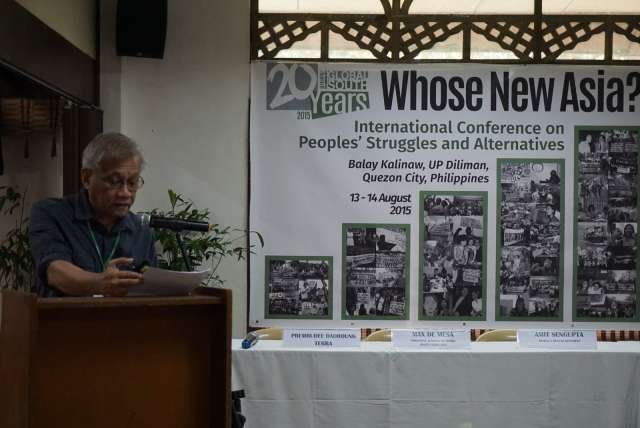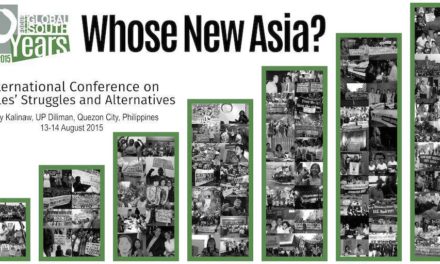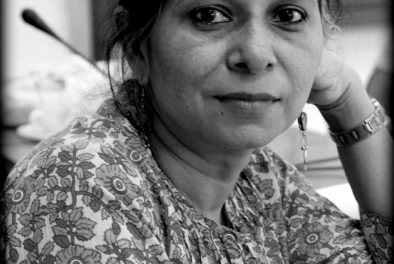Keynote Speech of Walden Bello at the International Conference on People’s Struggles and Alternatives
click here for more information about the conference
It is great to see so many of those who have been part of Focus on the Global South’s twenty-year journey here today, cherished comrades and friends, all of who are also 20 years older…but all still burning with youthful energy like Focus.
Focus was born in the same year as the World Trade Organization, with the goal of challenging that force of which the WTO was said to be the cutting edge: corporate-driven globalization. When we were founded, we were said to be on the wrong side of history. We were told that we were like the people who claimed that the earth was flat, that globalization would sweep all before it and deposit us in the dung heap of history. We were undeterred because we were convinced we were on the right side of history, on the side of the vast majority of people who were hurt and devastated by globalization.
Working with many others, some of them here today, Focus fought back. We were part of the 50,000 people in Seattle that brought down the Third Ministerial Meeting of the WTO in 1999. We also helped organize the opposition in Doha in 2001, Cancun in 2003, Hong Kong in 2005, all of which were massive civil society actions that brought the so-called cutting edge of global trade liberalization to a halt.
In the struggle against the WTO, civil society was not at first unified. There were some that sought compromise with the agency, seeking to reform some aspects of it, like the Agreement on Agriculture, allegedly to serve the needs of developing countries. Being a progressive research and analysis organization, Focus played a leading role in the fight against this line, arguing that giving in to a comprehensive deal on trade that would create rules promoting corporate interests while feeding scraps to the poor like giving their agricultural goods preferential tariffs was a bad idea. As our side put it then, no deal was better than a bad deal, and the task of global civil society was not to reform but to derail the WTO. The debate in civil society came to a head during the fifth ministerial meeting of the WTO in Cancun in 2003, and the collapse of that meeting under the combined assault of developing country governments and global civil society also buried with it the line that the WTO could be reformed to serve development and the interests of the poor.
Resistance, however, was not Focus’ only business. We were also engaged in exploring alternatives. We were part of the World Social Forum from its inception in 2000, working closely with other alter-globalization groups who believed that “Another world is possible.” Our India program played a key role organizing the historic World Social Forum in Mumbai in 2004, which brought the WSF to Asia. Our special contribution to this enterprise of exploring alternative ways of organizing the economy and society was the paradigm of Deglobalization, which brought together 14 principles around which an alternative economy could be constructed. Following the great thinker Karl Polanyi, Deglobalization calls for the re-embedding of market relations in society, meaning that social relations must reflect the subordination of market efficiency to the higher values of community, solidarity, and equality. The market’s role in exchange and the allocation of resources is important, but this must not only be balanced but subordinated to the maintenance and enhancement of social solidarity. Acting to balance and guide the market must not only be the state but also civil society, and in place of the invisible hand as the agent of the common good must come the visible hand of democratic choice. In place of the economics of narrow efficiency, we propose what we might call “effective economics.”
Fighting against global corporate rule and fighting for a sustainable economic and ecological path was not Focus’ only engagement. From the very start, Focus was designed to intervene in the debate around imperial rule and organizing against it. In 2002, our Philippine program organized a mission to Basilan Island to investigate the activities of US Special Forces sent to the area by the Pentagon, ostensibly to support Philippine forces carry out anti-terrorist activities. In 2003, Focus brought then Representative Etta Rosales of Akbayan and other Asian parliamentarians to Baghdad in a last-minute effort to stop the US invasion of Iraq. We got out of Baghdad only 24 hours before the Americans invaded via a GMC van that drove us through the scorching desert to Damascus. We went on to organize two international conferences against the war in Iraq in Jakarta in 2003 and Beirut in 2004. In 2006, Focus organized an Asian Peace Mission to investigate the unconscionable Israeli bombing of South Beirut and witness the victorious national effort led by Hezbollah to drive out the Zionist invaders from Lebanese soil.
Democracy and human rights have been central concerns of Focus. We have closely monitored political developments in the countries where we have programs–Thailand, the Philippines, Laos, Cambodia, and India—and coming out with analyses of how neoliberal economic policies have subverted democratic rule and, in the case of Thailand, contributed to the return of authoritarian rule. Focus is one of the leading groups behind the Sombath Initiative, which is designed to bring pressure on the Lao People’s Democratic Republic to release the disappeared activist with whom we worked closely to promote the interests of Laotian society: Sombath Somphone.
Our country programs are the pillars of Focus, and each of them has had their distinctive contributions. In Thailand, Focus has played a central role in stirring up opposition to bilateral free trade agreements. In India, we have led in the effort to come up with a national strategy to reclaim the commons. In the Philippines, Focus has become the lynchpin of the broad alliance for agrarian reform, Save Agrarian Reform Alliance, or Sara, that has led the fight for Carper, the law to extend agrarian reform that the landlord-led administration has failed to implement.
In recent years, Focus has become a key player in the global movement on climate change. Under the leadership of Pablo Solon, Focus took a critical approach towards the positions and performance of both the United States and China, the two biggest climate polluters, and championed the leading role of global civil society instead of states in addressing global warming. At the same time, we have participated in the articulation of the paradigm of “buen vivir,” or living in harmony with the community and the environment.
Understanding and resisting finance capital is another ongoing concern. During the Asian financial crisis in 1997 and 1998, Focus organized one of the first international civil society conferences on financial globalization and its destabilizing effects. Our analysis then identified the dangerous trends that would explode with even greater ferocity in the financial crisis of 2008, which led to the economic stagnation that plagues both the global North and global South to this day. We in Focus have advanced an analysis that locates the crisis in capitalism’s intrinsic dynamics.
Allow me to say a few words about this. The root cause of the financial crisis is, in our view, the crisis of overproduction that periodically overtakes capitalism, as Marx had told us as early as the 1860’s, when he wrote Capital. Beginning three decades back, we have had a growing crisis of overproduction. The roots of this lie in the gap between capitalism’s tremendous capacity to produce goods and the limited markets for those goods owing to persistent and growing income inequality. This has created a problem of overcapacity, with downward pressures on profitability in the productive sectors of the economy, that is, in agriculture, industry, and services. With declining profitability in these sectors, investors channeled their money into finance. The problem here is that investment in finance does not create new value, which is the basis of profits. Instead, profits stem from speculative coups. That is, people invest to drive up the prices of stocks and derivatives, make a killing, and leave, before prices plunge back to the value of the assets. Financialization creates asset bubbles that inevitably get punctured, since the law of gravity says that goes up must come down. And unless finance capital is brought under strict control, financial crises, with follow-on recessions in the real economy, will continue to erupt. Thinking about and bringing into reality such a system that effectively tames, subordinates, and eventually eliminates this destructive force is one of the key challenges before Focus and its allies.
As Focus enters its third decade, under the leadership of Shalmali Guttal, its overriding agenda is to understand and act on the trends, developments, and crises that have plagued today’s Asia. A key concern is the way that commodification of the commons, privatization, and deregulation have combined to create tremendous inequalities throughout the region. These inequalities have created tremendous stresses and conflicts, including the mass migration of workers, but they have also created the basis for possible new alliances across social groups and across borders that can be mobilized by a vision for a New Asia. Focus wants to be part of the process of analyzing these processes, coming up with a vision or paradigm for a New Asia, and organizing to realize this vision.
Let me briefly acquaint you with the key elements of the Focus methodology, developed over 20 years of activism.
First, analysis is not for analysis sake, but for action. Or, as one of favorites sayings has it, “Truth only becomes true through action.”
Second, we do not claim to speak for the people, but we fight to ensure their voices are heard loud and clear in the global debate. Focus is not a vanguard organization.
Third, we realize that our views are always partial, so that our preferred mode of action is moving in alliance with like-minded organizations familiar with other aspects of an issue. Focus is not a lone operator with a commando style of work, for we know that behaving as a lone operator is the easiest way to get into trouble, as some of our friends know only too well. But let us not mention names.
Fourth, we make no claims to originality. As we have often said, the Focus paradigm of globalization simply brings together ideas that others have generated over the past 30 years of this collective enterprise of coming up with an alternative economics. We do not believe in intellectual property rights and we welcome others to ransack our intellectual repository.
Finally, Focus is not doctrinaire. It has no vested interest in hanging on to an idea or an organizing approach. There is one exception to this though, there is one view that we will never give up, and this is that capitalism is an obsolete mode of production and must give way to new ways of organizing society and the economy.
Let me end by saluting all those who have served on the Focus staff and board over the last 20 years. Each of you has made a unique and important contribution to a valuable enterprise.
Let me express my gratitude as well to our friends and allies. Without you, Focus would not be where it is today.
To the funders of Focus, let me say, thank you for keeping the faith.
Finally, I would like us to give a minute of silence in remembrance of one of our first Board members, the late Josefa “Gigi” Francisco, who contributed so much to making sure that gender lay at the center of Focus’ concerns.
Thank you, Gigi, and thank you to all of you.






![[IN PHOTOS] In Defense of Human Rights and Dignity Movement (iDEFEND) Mobilization on the fourth State of the Nation Address (SONA) of Ferdinand Marcos, Jr.](https://focusweb.org/wp-content/uploads/2025/07/1-150x150.jpg)

